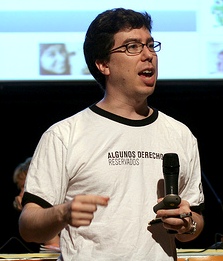
Jonathan Zittrain
Jonathan L. Zittrain (born December 24, 1969) is an American professor of Internet law and the George Bemis Professor of International Law at Harvard Law School. He is also a professor at the Harvard Kennedy School, a professor of computer science at the Harvard School of Engineering and Applied Sciences, and co-founder and director of the Berkman Klein Center for Internet & Society. Previously, Zittrain was Professor of Internet Governance and Regulation at the Oxford Internet Institute of the University of Oxford and visiting professor at the New York University School of Law and Stanford Law School. He is the author of The Future of the Internet and How to Stop It as well as co-editor of the books, Access Denied (MIT Press, 2008), Access Controlled (MIT Press, 2010), and Access Contested (MIT Press, 2011).
Jonathan Zittrain
December 24, 1969
Professor
Zittrain works in several intersections of the Internet with law and policy including intellectual property, censorship and filtering for content control, and computer security. He founded a project at the Berkman Klein Center for Internet & Society that develops classroom tools.[1] In 2001 he helped found Chilling Effects, a collaborative archive created by Wendy Seltzer to protect lawful online activity from legal threats. He also served as vice dean for Library and Information Resources at Harvard.[2]
Internet filtering[edit]
The OpenNet Initiative (ONI) monitors Internet censorship by national governments. Between 2001 and 2003 at Harvard's Berkman Center, Zittrain and Benjamin Edelman studied Internet filtering. In their tests during 2002, when Google had indexed almost 2.5 billion pages, they found sites blocked, from approximately 100 in France and Germany to 2,000 in Saudi Arabia, and 20,000 in the People's Republic of China. The authors published a statement of issues and a call for data that year.[24]
Building on the work completed at the Berkman Center, ONI published special reports, case studies, and bulletins beginning in 2004,[25] and as of 2008, offered research on filtering in 40 countries as well as by regions of the world.[26] As of 2016, Zittrain remains a principal investigator at ONI, together with Ronald Deibert of the University of Toronto, John Palfrey, who was previously the executive director of the Berkman Center (now the head of School at Phillips Academy in Andover, Massachusetts[27]), and Rafal Rohozinski of the University of Cambridge.[28]
In 2001, Zittrain cofounded Chilling Effects with his students and former students, including its creator and leader, Wendy Seltzer. It monitors cease and desist letters. Google directs its users to Chilling Effects when its search results have been altered at the request of a national government.[15][29] Since 2002, researchers have been using the clearinghouse (renamed "Lumen" in 2015) to study the use of cease-and-desist letters, primarily looking at DMCA 512 takedown notices, non-DMCA copyright, and trademark claims.[30][31]
Copyright[edit]
On October 9, 2002, Zittrain and Lawrence Lessig argued a landmark case, known as Eldred v. Ashcroft, before the United States Supreme Court. As co-counsel for the plaintiff, they argued that the Sonny Bono Copyright Term Extension Act (CTEA) was unconstitutional.[32] The court ruled 7–2 on January 15, 2003, to uphold the CTEA which extended existing copyrights 20 years, from the life of the author plus 50 years, to plus 70 years. In the words of Justice Ruth Bader Ginsburg, the petitioners did "not challenge the CTEA's 'life-plus-70-years' time span itself. They maintain that Congress went awry not with respect to newly created works, but in enlarging the term for published works with existing copyrights." The court found that the act did "not exceed Congress' power" and that "CTEA's extension of existing and future copyrights does not violate the First Amendment".[33] In 2003 Zittrain said he was concerned that Congress will hear the same arguments after the 20-year extension passes, and that the Internet is causing a "cultural reassessment of the meaning of copyright".[34]
Stock markets and spam[edit]
Writing with Laura Freider of Purdue University, in 2008 Zittrain published Spam Works: Evidence from Stock Touts and Corresponding Market Activity, in the Hastings Communications and Entertainment Law Journal to document the manipulation of stock prices via spam e-mail.[46] They found evidence that "stocks experience a significantly positive return on days prior to heavy touting via spam" and that "prolific spamming greatly affects the trading volume of a targeted stock". Apart from transaction costs, in some circumstances the spammer earned over 4% while the average investor who bought on the day of receipt of the spam would lose more than 5% if they sold two days later.[47] Frieder said in 2006 that she knew of no other explanation for their results, but that people do follow the stock tips in their spam e-mail.[46]
Facebook[edit]
In February 2019, Zittrain interviewed Facebook CEO Mark Zuckerberg as part of a seminar for students at Harvard.[48]